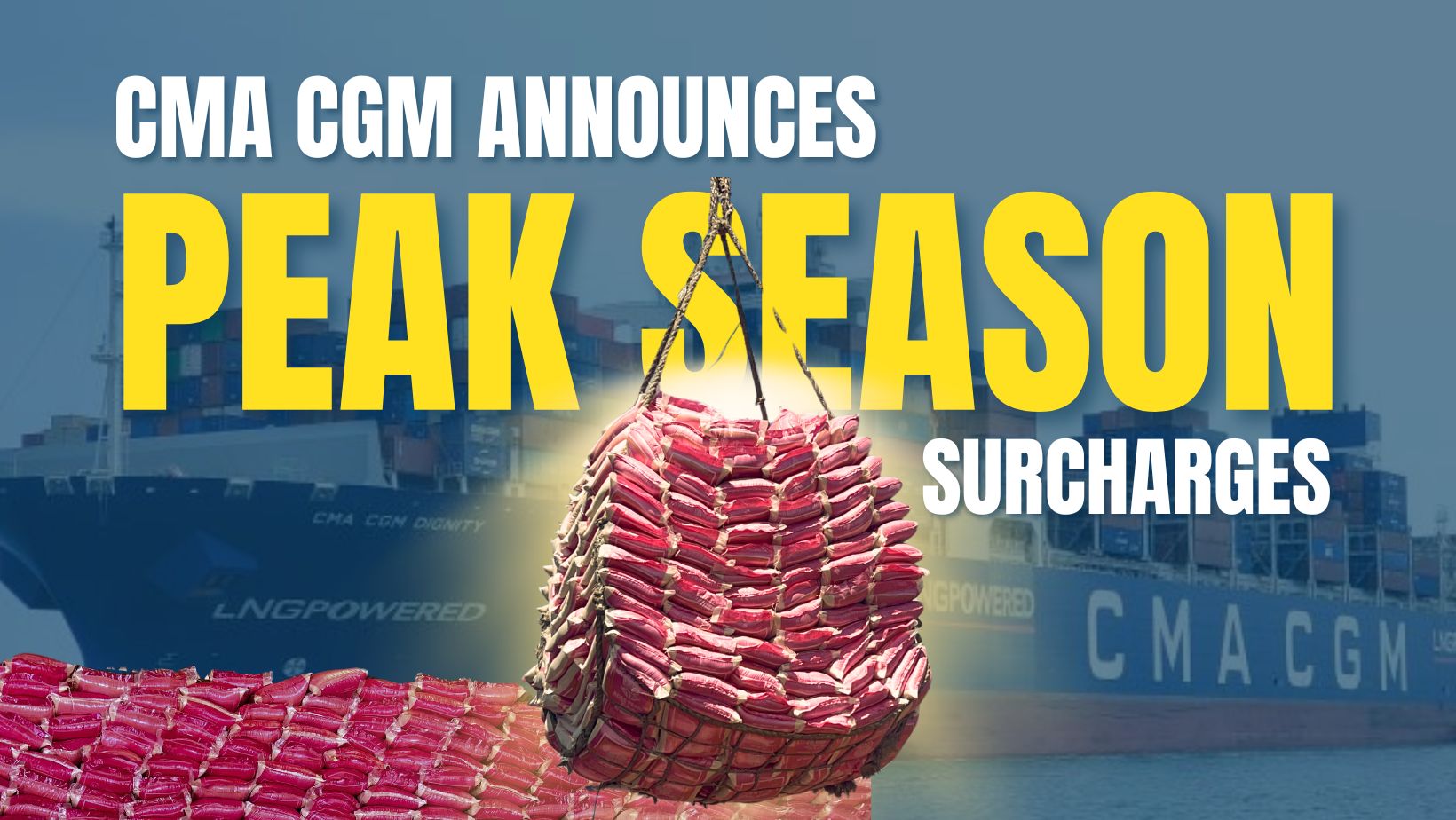
As the global shipping industry gears up for the peak season, Marseille-based box line CMA CGM has announced a series of Peak Season Surcharges (PSS) that will impact shipments across several key routes. These surcharges, effective from late July and early August, are poised to influence the cost structure of shipping in the coming months.
What is the Peak Season Surcharge?
The Peak Season Surcharge (PSS) is an additional fee applied by shipping companies during high-demand periods. This surcharge helps carriers manage the increased costs associated with the higher cargo volume. The surcharge is typically introduced during peak shipping seasons when the demand for shipping services exceeds the available supply, leading to congestion at ports and delays in cargo handling.
Key Surcharge Details
1. Middle East Gulf & Pakistan to South Africa
Starting from July 20, 2024, CMA CGM will implement a PSS of US$200 per 20-foot container for shipments originating from all Middle East Gulf and Pakistan ports to South Africa. This surcharge will remain in place until further notice, indicating a potentially indefinite duration.
2. North Europe to Africa
From August 1, 2024, a significant surcharge will be applied to cargoes from North Europe (including the Baltic and Scandinavia), the United Kingdom, the West Mediterranean, the East Mediterranean, the Adriatic, Morocco, North Africa, and the Black Sea. Destinations affected include Nigeria, Ghana, Cameroon, Togo, Benin, Angola, Gabon, Sierra Leone, Congo, the Democratic Republic of Congo, Namibia, and Equatorial Guinea. The surcharge rates are set at:
- €400 per container
- US$400 per container
- GB £300 per container
This applies to both dry and refrigerated (reefer) cargo.
3. United States and Canada to Africa
Additionally, a PSS of US$400 per container will take effect from August 5, 2024, for shipments from the United States and Canada to the same African destinations mentioned above. This surcharge will also continue until further notice.

Understanding the Impact on Shipments
The implementation of these surcharges by CMA CGM is a response to the heightened demand typical of the peak shipping season. Shippers and logistics providers need to be aware of these changes to budget appropriately and adjust their shipping plans accordingly. The added costs are a natural phenomenon in the logistics sector, especially during increased cargo movement.
Why These Surcharges Matter
- Budgeting and Cost Management: For businesses relying on imports and exports, understanding these surcharges is crucial for accurate budgeting and cost management. Unexpected increases can significantly impact profit margins.
- Supply Chain Planning: Companies must plan their supply chain activities considering these additional costs to avoid disruptions and ensure smooth operations during the peak season.
- Strategic Decisions: This information can guide strategic decisions about which shipping routes and schedules to use, potentially influencing the choice of shipping lines and logistic strategies.
Why Was This Order Passed?
The decision to implement these surcharges stems from several key factors affecting the global shipping industry:
1. Increased Demand for Shipping Services: The global economy is experiencing a robust recovery post-pandemic, leading to a surge in international trade. The heightened demand for shipping services during peak seasons, such as the back-to-school and holiday periods, has strained the capacity of shipping lines. To manage this increased demand and ensure reliable service, surcharges like the PSS are necessary.
2. Port Congestion: Major ports around the world, including those in the Middle East Gulf and South Africa, are experiencing significant congestion. This congestion is caused by various factors, including labor shortages, inefficiencies in cargo handling, and an influx of containers. The PSS helps mitigate the operational challenges and additional costs that arise from these congested conditions.
3. Rising Operational Costs: Shipping companies are facing rising operational costs, including fuel prices, labor costs, and maintenance expenses. Implementing a surcharge allows companies like CMA CGM to offset these increased costs and maintain the financial viability of their operations.
4. Container Shortages: The global shortage of shipping containers has exacerbated the challenges faced by the shipping industry. The imbalance in the availability of containers has led to delays and increased costs for shipping companies. The PSS helps manage the allocation and efficient use of the limited container supply.
5. Service Reliability: By imposing a PSS, CMA CGM aims to ensure that they can continue to provide reliable and timely shipping services. The surcharge acts as a financial buffer that supports the company’s ability to meet customer expectations despite the challenges posed by the peak season.
Preparing for the Peak Season
To mitigate the impact of these surcharges, consider the following strategies:
- Advance Planning: Book shipments in advance to secure better rates and avoid last-minute surcharges.
- Route Optimization: Explore alternative routes or shipping lines that might offer more competitive rates during the peak season.
- Negotiation: Discuss with shipping lines for possible discounts or bundled service agreements.
Conclusion
CMA CGM’s implementation of Peak Season Surcharges underscores the dynamic nature of global shipping costs. Staying informed and proactive can help businesses navigate these changes effectively, ensuring a smoother transition through the peak shipping season.
To understand more, How indian exporters are tackling this situation, Click here –Indian Exporters Requests for National Shipping Line to Enhance Global Competitiveness
Check more of our Blogs & Do Follow us on Our Social Media channels to stay ahead in your rice business
